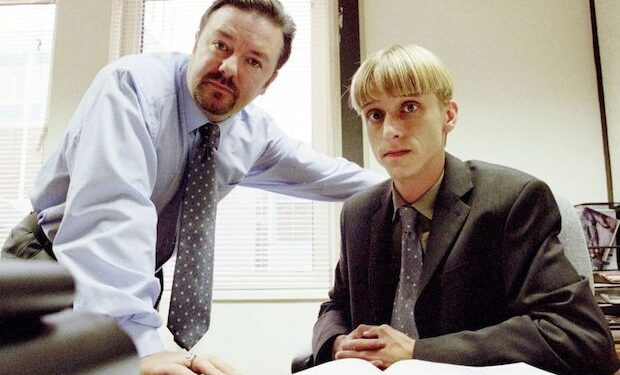“The Office,” a British mockumentary sitcom, first aired on July 9, 2001. Created by Ricky Gervais and Stephen Merchant, the series offers a satirical glimpse into the mundane and often awkward lives of office employees at the fictional Wernham Hogg paper company in Slough. This seminal show redefined the comedy genre with its unique format and has since inspired numerous adaptations worldwide.
The First Episode: “Downsize”
The premiere episode, titled “Downsize,” introduces viewers to the drab environment of Wernham Hogg. The plot revolves around the potential downsizing of the office, creating tension among the staff. The episode is notable for its dry humour and documentary-style filming, which gives a sense of realism to the fictional setting.
Key characters are introduced, including:
- David Brent (Ricky Gervais): The bumbling and self-delusional regional manager, whose inappropriate behaviour and misguided attempts at humour set the tone for the series.
- Gareth Keenan (Mackenzie Crook): The office’s sycophantic assistant to the regional manager, known for his peculiar personality and military obsessions.
- Tim Canterbury (Martin Freeman): A relatable everyman who is often the voice of reason amidst the chaos, and whose unrequited affection for receptionist Dawn Tinsley is a recurring theme.
- Dawn Tinsley (Lucy Davis): The receptionist who dreams of a better life, stuck in an unfulfilling relationship and job.
The episode is a masterclass in establishing character dynamics and setting up the series’ ongoing themes of workplace absurdity and human vulnerability.
Ricky Gervais: The Creative Force
Ricky Gervais, who co-created and starred in “The Office,” was relatively unknown before the show’s debut. His portrayal of David Brent catapulted him to fame, showcasing his distinctive comedic style marked by uncomfortable humour and poignant social commentary. Gervais’ performance as Brent is both cringe-worthy and sympathetic, making the character a complex figure rather than a one-dimensional joke.
Gervais’ influence extends beyond acting; his vision for the series was instrumental in its success. He and Stephen Merchant crafted a show that broke away from traditional sitcom formats, opting instead for a documentary style that allowed for more naturalistic performances and an intimate viewer experience.
Legacy and Impact
“The Office” ran for two series and two Christmas specials, concluding in 2003. Despite its relatively short run, its impact on television comedy is profound. The show’s format and humor have influenced countless other series, including the highly successful American adaptation starring Steve Carell.
The British version of “The Office” is celebrated for its realistic portrayal of the workplace, its character-driven humour, and its ability to blend comedy with moments of genuine pathos. Ricky Gervais’ performance and creative vision remain central to its enduring legacy, cementing “The Office” as a landmark in television history.
“The Office” stands out as a pioneering work in the realm of sitcoms. Its first episode set the stage for a series that would not only entertain but also challenge and redefine comedic conventions. Ricky Gervais’ contributions as both a performer and a creator have left an indelible mark on the genre, making “The Office” a timeless classic that continues to resonate with audiences around the world.
newshub



Recent Comments